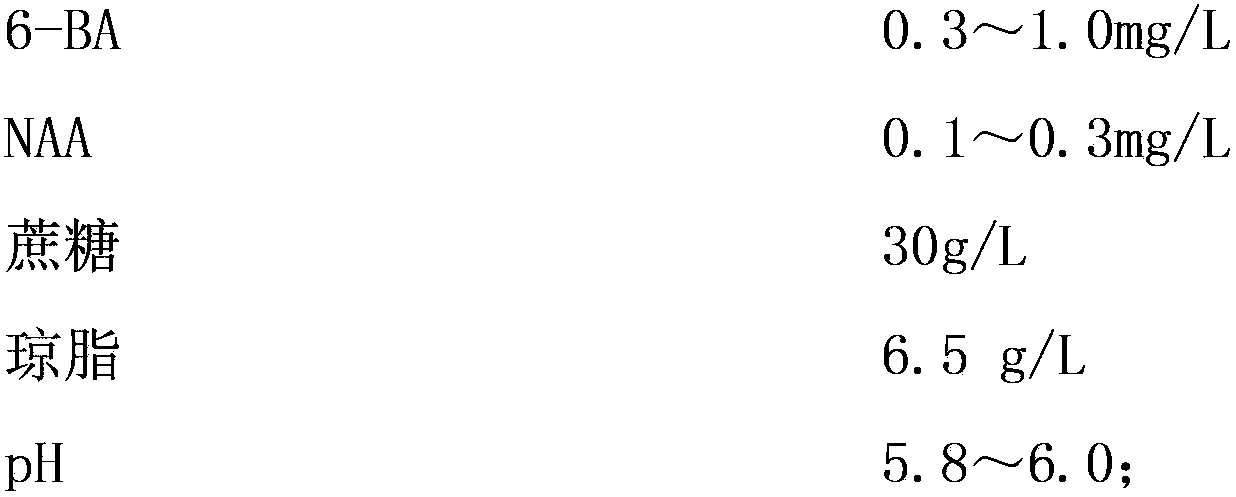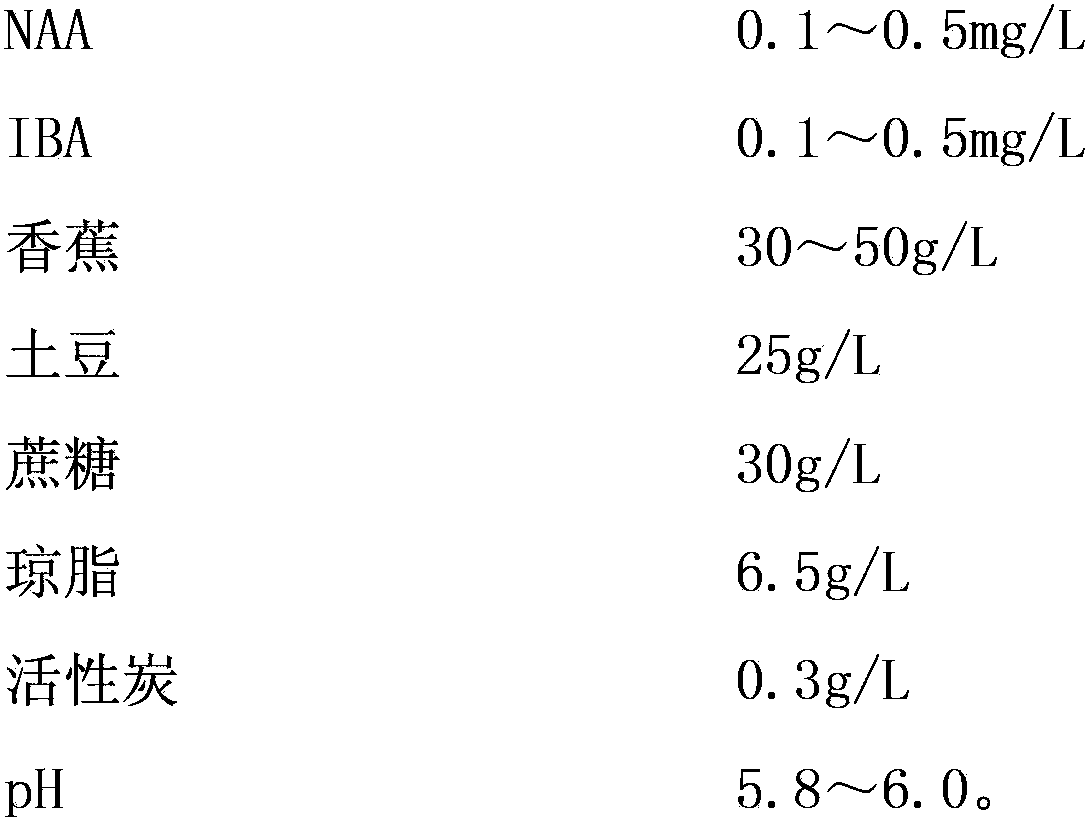Davallia mariesii breeding method
A technology of alpine fern teeth and formula, which is applied in the fields of fern propagation and flower cultivation, can solve the problems of high material requirements, difficulty in large-scale production, and large dosage, so as to improve economic benefits, strong adaptability, and stable seedling properties Effect
- Summary
- Abstract
- Description
- Claims
- Application Information
AI Technical Summary
Problems solved by technology
Method used
Image
Examples
Embodiment 1
[0048] (1) Take the mature alpinia spores, wrap them with gauze, soak them in 75% alcohol for 30 seconds in an ultra-clean environment, and put them in a mercuric chloride solution with a mass fraction of 0.1% for disinfection. 6min, disinfected in sodium hypochlorite mixture for 10min, then rinsed with sterile water 4 to 5 times, each time for 2min, to obtain the aseptic spores of alpine fern. The sodium hypochlorite mixture is mixed with sodium hypochlorite solution and Tween 20 , The ratio of sodium hypochlorite solution and Tween 20 is: add 2 drops of Tween 20 to 100ml of sodium hypochlorite solution with a mass fraction of 2%.
[0049] (2) Induction and proliferation culture: the sterile spores obtained in step (1) were inserted into a culture bottle filled with the following induction proliferation medium:
[0050] MS Basic Medium
[0051]
[0052] Cultivate in dark for 15 days at a temperature of 23°C, then switch to a light intensity of 2000lx, a temperature of 23°...
Embodiment 2
[0061] Embodiment 2 is the same as Embodiment 1 except that the following measures are different, and will not be repeated. (1) Take the mature alpinia spores and wrap them with gauze, and soak them in 75% alcohol for 35 seconds in an ultra-clean environment.
[0062] (2) The induced proliferation medium for induction and proliferation culture is:
[0063] MS Basic Medium
[0064]
[0065] Cultivate in dark for 16 days at a temperature of 25°C, then switch to a light intensity of 1800lx, a temperature of 25°C, and a light time of 9h / d, and continue to cultivate until the spores of Alpinia alpiniae germinate and differentiate into green spheroids, and the green spheroids cut open.
[0066] (3) Subculture: 28 days per subculture, 3 times for subculture, the conditions of subculture are: light intensity is 1800lx, temperature is 25°C, light time is 9h / d, subculture is 27d , the medium for subculture is identical to the formulation of the induced proliferation medium describ...
Embodiment 3
[0073] Embodiment 3 is the same as Embodiment 1 except that the following measures are different, and will not be repeated.
[0074] (1) Take the mature alpinia spores and wrap them with gauze, then soak them in 75% alcohol for 40 seconds in an ultra-clean environment.
[0075] (2) The culture medium for inducing proliferation is:
[0076] MS Basic Medium
[0077]
[0078] Cultivate in the dark for 15 days at a temperature of 27°C, then switch to a light intensity of 1500lx, a temperature of 27°C, and a light time of 10h / d, and continue to cultivate until the spores of Alpinia alpiniae germinate and differentiate into green spheroids, and the green spheroids cut open.
[0079] (3) Subculture: 30 days per subculture, 5 subcultures in total, the subculture conditions are: light intensity 1500lx, temperature 27°C, light time 10h / d, subculture 30d, The medium formula of the subculture is the same as that of the induced proliferation medium described in step (2).
[0080] (4...
PUM
| Property | Measurement | Unit |
|---|---|---|
| transmittivity | aaaaa | aaaaa |
Abstract
Description
Claims
Application Information
 Login to View More
Login to View More - R&D
- Intellectual Property
- Life Sciences
- Materials
- Tech Scout
- Unparalleled Data Quality
- Higher Quality Content
- 60% Fewer Hallucinations
Browse by: Latest US Patents, China's latest patents, Technical Efficacy Thesaurus, Application Domain, Technology Topic, Popular Technical Reports.
© 2025 PatSnap. All rights reserved.Legal|Privacy policy|Modern Slavery Act Transparency Statement|Sitemap|About US| Contact US: help@patsnap.com



